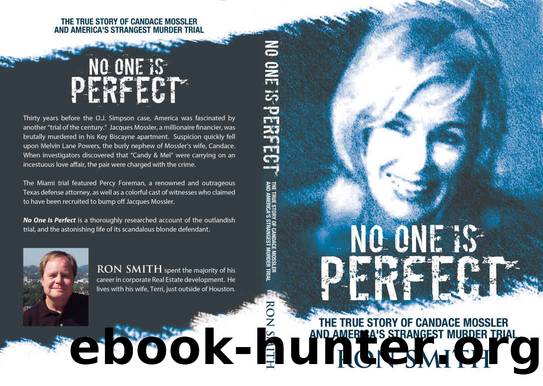No One Is Perfect: The True Story Of Candace Mossler And America's Strangest Murder Trial by Ron Smith

Author:Ron Smith [Smith, Ron]
Language: eng
Format: azw3
Published: 2018-07-21T00:00:00+00:00
Part V
âI have stole and cheated, but I ainât gonna kill nobodyâ
_______________________________________________________
Twenty
â
On September 16, 1965, counsel for the defendants once again petitioned for separate trials. Percy Foreman, speaking on behalf of Powers, told the court, if the pair were tried together, âIt would be like shooting a rabbit tied to a string. Itâs unsporting, and unfair.â Few reporters in the Miami contingent quite understood the east Texas hunting analogy.
Foreman also advised the court, and justly so, that the two defense teams were antagonistic. Clyde Woody nodded his head in agreement from the defense table. Woodyâs co-counsel, and partner, Marian Rosen, asked that it be placed on the record that, if the defendants were tried jointly, each of them would lose the right to cross-examine the other. Rosen also argued that, in the event that one of the defendants chose to testify, the other defendant could not be forced to testify. It was clear that Woody and Rosen still feared the possibility that Powers might cut a deal, in exchange for testifying against Candace.
George Schulz was back on the bench for this hearing, and Richard Gerstein countered Foremanâs claim of antagonistic co-counsel by reminding the court that Candace Mossler was paying Melâs attorney fees. The implication was that all of the lawyers worked for Candace - how could there be antagonism? It was a murky argument. Ethically, each defendant was entitled to independent counsel, regardless of who paid their fees. By trying the defendants together, Gerstein understood that it increased the likelihood of a split between camps, which was precisely what he hoped for. If one of the rabbits broke loose from the other, they would come running to Gerstein to cut a deal.
Schulz closed the hearing with the promise that he would rule on the petition for separate trials within two weeks. He took longer than that. On October 23, Schulz came around to the idea that, if he held to the November 15 trial date, the proceedings would intrude on the holiday season. Schulz already felt sorry for any citizens impaneled on this particular jury - there was no reason to ruin their Thanksgiving, and Christmas (or his own). He delayed the trial until January 17, 1966. He continued, however, to delay his ruling on the request for separate trials.
Schulz did rule that day on one of the most important, and contentious, components of the stateâs case against Mel Powers. Schulz ruled that the confession made by Powers to Manson Hill and Charles Maddox would not be allowed into evidence. In the habeas corpus hearing, Detective Charles Maddox did his best to salvage the crucial confession, claiming that he had advised Powers that anything he said could be used against him. Maddox also claimed that Powers was given an opportunity to call an attorney.
According to Maddox, Powers said, âMy family knows where I am. Theyâll get an attorney, if I need one.â Virtually nothing in Maddoxâs statement was true. Mel had been swept away by the Rangers on a
Download
This site does not store any files on its server. We only index and link to content provided by other sites. Please contact the content providers to delete copyright contents if any and email us, we'll remove relevant links or contents immediately.
Melania and Me by Stephanie Winston Wolkoff(1066)
Orlando by Virginia Woolf; Mark Hussey(1059)
The Class of 83 by Hussain Zaidi(1012)
Live in Love by Lauren Akins & Mark Dagostino(988)
Dancing in the Mosque by Homeira Qaderi(975)
A History of My Brief Body by Billy-Ray Belcourt(919)
Virginia Woolf by Between The Acts(796)
Just as I Am by Cicely Tyson(767)
The Common Reader, Book 1 by Virginia Woolf(765)
Stranger Care by Sarah Sentilles(761)
Robespierre: A Revolutionary Life by Peter McPhee(756)
The Schoolgirl Strangler by Katherine Kovacic(752)
1914 by Luciano Canfora(740)
Ariel (english and spanish Text) by Sylvia Plath(735)
Unforgetting by Roberto Lovato(730)
Harriet Tubman: The Biography by University Press(725)
Berlin Diary: The Journal of a Foreign Correspondent 1934-41 by William L. Shirer & Gordon A. Craig(724)
Broken Horses by Brandi Carlile(720)
Paris Without Her: A Memoir by Gregory Curtis(720)
